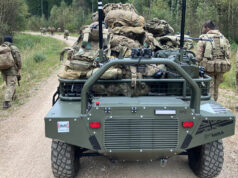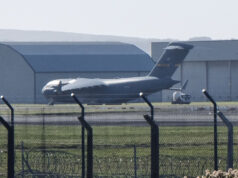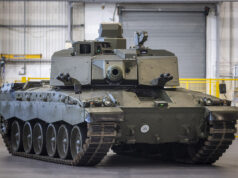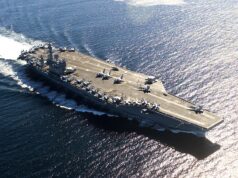Luke Pollard used his first major speech as Minister for Defence Readiness and Industry at DSEI 2025 to set out a clear challenge to both the Ministry of Defence and industry.
“It really is a superb showcase, not just for British industry, British ingenuity, but how as an alliance of nations that stand together against the threat, we can see how one country’s innovation can support others,” Pollard said at the start of his address.
He linked his new brief to the government’s broader defence reform agenda: “I was honoured to be asked by the Prime Minister a few days ago to step up… to take on a new role looking not just at procurement… but at readiness as well.”
The minister pointed to the uplift in defence spending as an opportunity and a test. “By April 2027 we’ll be spending 2.5% on defence, 2.6% of qualifying NATO spend, 3% in the next parliament and 3.5% of our GDP as part of that 5% NATO security pledge by 2035. That’s an enormous uplift in defence spending, the biggest since the end of the Cold War.”
But he stressed this required reform. “Spending more means we have to spend it wiser than we have done in the past, and to deliver that vision, we need to be smarter in how we invest.” The Defence Industrial Strategy, published earlier in the week, included “£773 million of money to make the UK the best place in the world to start and grow a defence business.”
Pollard repeatedly returned to his theme of defence as “an engine for growth.” He challenged industry to tell its story more effectively: “When people say we don’t build things anymore, show that to be the lie it is. Show them the first-class production facilities that we have. Show them the energy and ingenuity of our workforces.”
He warned that procurement needed cultural change. “We are too slow. The Ministry of Defence is too slow, and as a result, industry is reflecting that back. We need to speed up our procurements… Procurements that take five years need to take two years. Those that take two, need to take one.”
Pollard also called for a rethink of risk. “Peacetime procurement was fine when we were in peacetime, but you all know that we are not at war, but nor are we at peace any longer. So our procurement system needs to adapt.”
In one of the speech’s most pointed sections, he demanded the removal of what he called “stupid rules” across defence: “In the past year, we have removed 100 outdated medical requirements that stopped people joining our Armed Forces. We removed the stupid rule that said if you had an inhaler when you were three years old and haven’t used one since then you were medically unfit to join… We removed the stupid rule about acne and spots.” He invited industry to submit its own examples of obstructive processes.
Pollard described a personal example from Plymouth, where a company had spent £1.5 million on diesel generators because “they couldn’t get the decision to spend £70,000 to fix those cables. That is an appalling use of taxpayer’s money.”
The minister closed by stressing the link between defence, industry, and society. “We will have war fighting readiness when industry feels empowered to be more efficient, to give it the stupid rules that we have put in place that constrain your ability to work, to make us attract and retain more people in our forces in industry and beyond.”
And he reminded his audience of the stakes: “At a point at the moment where our friends in Ukraine are carrying a fight for everyone that believes in freedom and democracy… if we can do it for Ukraine, we can provide the same speed and agility for UK Armed Forces as well.”














seems pretty clear that the gutting of our army and forces more generally has been done by giving CRAPITA the recruitment contract with massively outdated medical requirements. CRAPITA will have followed this to the letter as they are suppose to but with no possible medical procedure to get around it.
CRAPITA is just a company following a job, it really saddens me that the Army leadership cares so little about recruitment that they did not see this coming or is just so low bar that they never though this would happen.
As usual everything will be blamed on the politicians, treasury and civil service while high ranking officers will have yet more tin pinned to their chests while lining up civilians roles (with CRAPITA no doubt)
The RAF and RN just don’t see to have a fraction of the procurement and recruitment problems of the Army and I think the blame can be largely laid at the feet of the officers they recruit.
Your last comment is so wholly inaccurate that it makes the rest of your statement seem silly. I raise you T45 – 12 down to six because it was gold plated by the RN and they couldn’t afford it. Carriers – almost a decade late and twice the projected cost. Only now reaching FOC. Astute, T26…. the RN manning is woeful.
RAF – killed Harrier and with it carrier strike to maintain Tornado, Nimrod MRA4…..
And you do know that the MOD have decided to replace all SS recruiting with a tri-service outsource via SERCO? Let me tell you, the Army leadership care a huge amount about recruitment. However, under the Levine reform, they were held to account for their budget. And they couldn’t afford to maintain in-house recruiting within that budget. I was literally in a meeting in Army HQ as a young SO2 in August 2017 where we were trying to save a £1bn (that’s with a B) by Christmas to balance the budget (because the RAF and RN had already blown theirs).
Don’t blame senior leaders for something when actually they were trying to deal with a very complex and very bad deal given to them by politicians.
The thing is you can lay all those bad decisions at the door of in year accounting. I have in my career seem so many bad decisions that saved up inefficiencies and extra costs for the future on desperate acts to stay in budget in year.
Although humans are humans and you can generally see that when pushed to make a decision they don’t think of the greater good they naturally go inward and protect what is closest to them….the RAF and is willingness to alway throw Carrier strike under the bus when put under pressure is a great example. The constant shafting of the NHS by the social care system another one ( at vast cost to the taxpayer..one of the biggest inefficiencies in this country is the fact acute hospitals act as massive care homes).
Of course a great many problems within Britain’s defence forces, not confined to procurement, are caused by inter service petty point scoring…….
Jim, was it really the Army staff that imposed the silly old medical restrictions on Capita for them to implement? Do you know that for a fact?
“ £773 million of money to make the UK the best place in the world to start and grow a defence business”
So have you somehow stopped the practice of end of year spending freezes to meet in-year budgets? The kind of thing that drives SME’s cash flow to the wall? I’m sure there is a ‘ring fenced’ fund that will survive for a year or so but it will be raided when the ever hungry DNE needs a year end bail out.
Or somehow stopped desk officers going cold on the next stage of a program and not returning calls or emails for months…
The systems and the cultures are the issues.
The first issue is that conventional equipment purchase needs hard ring fenced funding as does R&D. The issue is lack of transparency over where that money is spent.
The only way you get that is external reporting with your pants nailed to the mast.
Otherwise none of this makes an iota of difference.
Yes you have nailed the problem… in year accounting, you simply cannot run complex strategic industries on in year accounting, it does not work, you invariably starve them of cash, creating bottle necks that create inefficient management, this then escalates into more funding bottle necks and you amplify the affects, creating greater and greater inefficiencies.. and reducing cost effectiveness.
Thing is that it is not an origional though process.
NAO have frequently pointed out they in year cost savings less to blow out elsewhere; and
PAC have said the same; and
Defence Select Committee have, when they remember the day of the week, said pretty much the same thing.
Not only in year accounting but shuffling capital expenditure beyond OBR forecast bounds (5 years) is common political tactics. If it’s >5 years in the future OBR doesn’t consider it when analysing budgets and debt.
Type 26 have already been subject to treasury reprofiling for this reason ( anyone remember 13 frigates in service by 2020s?). Ajax – procurement ‘phased’ to smooth capital outlays. Not to mention HS2, Sizewell, etc…. We’re not accelerating towards 3.5 sooner because the OBR is currently accounting up to 2030 and they can’t find growth.
It’s smelly accounting leading to lack of capability and more cost per item.
I would like to see a modern version of a War Cabinet to oversee the UK’s military build-up from the highest level, with all service heads steering the primary needs. The current ‘Risk Level’ is quickly becoming critical, requiring a steering group including the very best from industry to ensure fast procurement and rapid in-service proticals. The peace line in Europe is as fragile as it has been since WW2, and the sooner the British people are officially informed the better. No nation reacts like the British when faced with a stark reality, and if it means high taxes and the accompanying pain, then they will endure.
I love how ministers warn endlessly.
Yet themselves are in the driving seat.
Yes that was just what I thought. The CEO should be saying “ this is what we are doing” not “ if we don’t do this we will be in trouble” essentially is the denial of responsibility that we see in all political parties from reforms “ they are all shit” to labours “ its the tories fault” the conservatives “ that was a previous administration” the nationalists “ it’s all Westminsters fault”:I don’t see a single politician at present who will stand up and own the problems and take responsibility.
Well no shit. Well done for stating the obvious.
Speeding up procerment seems pretty obvious and hopefully with the path to increased spending layed out, it gives planners more certainty regarding funding for new equipment.
However the MoD must also be shaken from this mindset of demanding the best, as all to frequently when it does arrive it is years late, way over budget and outdated.
And there you have the fundamental reason why the west is steadily losing “we are not at war, but nor are we at peace any longer” …that statement is profoundly and catastrophically wrong, it’s based on a modern western assumption of what war is that is fundamentally flawed. War is essentially constant if you have a perceived enemy, you do not transition from peace to war, you transition through different domains of war, but you are still at war. The Cold War was never peace it was always a war, the Reagan doctrine was simply the west fully embracing this and because it did it finally beat international communism. China fully embraced this and it’s why it’s become the predominant maritime power in the world today, Russia has adopted it and its way it’s made so much headway in Africa.. infact probably Putins big strategic error was he got impatient and decided to shift domains of war to early in Ukraine.
But war is many domains, Political, cultural, legal, economic, industrial, market control, resource control, diplomatic… nations win and loss in these domains.. kinetic war is generally either a finisher when you think your enemy is done or a transition point to add one of the other domains.
The west forget all of this because of its obsession with the theory of the end of history and the last man, which basically stated that western liberal free market systems were so superior that nothing could compete in the wider domains of war and as the west had complete military superiority it had essentially won history… shame it was BS and china realised how you actually win ( having taken note of things like it’s own fight with the Japanese empire, the rise of the British empire, the U.S. and the fall of the Soviet Union).
Presumably he is going to crack on and buy something then? Of course it could be something for him to say in his first speech! Either way 2.5 % of an economy that is flatlining is not worth crowing about.
At this point is anyone actually expecting any orders, orders have become myth, cuts are the only reliable trend. It’s all about cooperation agreements, partnerships and studies for headlines, rather than providing what’s needed in a reasonable timeframe, which was yesterday for many programs considering decades of procurement issues.
Look at Patria Cavs, it was announced at DSEI that the U.K. had joined the program (great) but there was no details, no numbers, no order, it was as if it was a last minute thing for a headline, why announce it if it’s not ready, why not hold it back until it can be unveiled properly alongside a competent plan to show how procurement is changing, rather than just another item that may or may not come at some point, can really see the improvements in the procurement process…
The sad thing is that the Cavs program even with such limited information appears to be the only item moving towards procurement from DSEI, although it apparently wasn’t even worth a headline at UKDJ, ARES IFV got two articles with no actual program or procurement requirement or plan.
The quiet part the Govt doesn’t say out loud is that the defence industry and shows like DSEI are there to create jobs and show products they want other countries buying from UK so that the govt doesn’t have to.
I wonder if T31B2/T32 will be more likely if there are no UK built T31 export orders to avoid the yards being without work.
Spot on.
The usual headlines for headlines sake, not actual substance.
Agree with Patria.
An Ajax IFV is far sexier. Look at the crowds around the vehicle, and did I spot the new Minister for DP, Louise Sandher-Jones,
at left of that photo?
I’m pleased to see she is ex Int Corps as well.
The hype around the Ajax IFV makes sense, IFVs should never have been omitted from the plan, but currently there is nothing indicating the govt will purchase one, certainly not any time soon with the funding situation, Cavs seems more feasible short term with it being part of LMP program, which was supposed to be funded and a program which really should have been delivered years ago.
I’m not sure a new Minister of DP will change much, the issue is from the Treasury who really gets to call the shots. Perhaps we are looking at it all wrong, you can’t say procurement hasn’t improved if you don’t procure to begin with ! The defence equipment plan is not looking promising if there was nothing of substance to be announced a little bit early at DSEI.
I thought that Louise Sandher Jones was the new Defence Minister, not procurement. And that Luke Pollard remains Procurement Minister but has ‘readiness’ added to his role and title. Or am I confused?
That was meant to reply to Daniele
at least Pollard uses the word “we” and accepts HMG and MOD are the core of the problem along with a military hierarchy who spend all their time tinkering with what it is they thought they wanted yesterday.
There is a very pertinent quote from Adm Radakin reported in today’s Grauniad.
He makes a comment in a speech which he was not allowed to say when in post. He talks about the bureaucratic nature of MOD procurement, with often 20 or more people involved in a Zoom discussion, any o e of whom can block, delay or nix a project. He says you only need two people, one of them the perdon responsible for the project, the other I imagine the techie/engineer/supplier, if they agree,
you go ahead.
It sounds like he thinks the current process is nuts.
He also makes the pithy point that the number of senior civil servants has grown by MORE THAN 80% since 2019, while the number of service stars is unchanged.
This reinforces my view, hinted at by various previous CDS and CGS that the services have very little control over procurement or anything also in the MOD. The civil service mandarins and their chums on DESO etc run the show and make the decisions. Trouble is, the civvys include artmfuls of bright young Oxbridge arts graduates who have about zero experience or knowledge of things military. Basically, we have a bunch of keen amateurs led by CS donkeys running procurement, with a mafia of sharp accountants sitting at everyone’s elbow and chiming in with their little twopenniworth.
The future command structure at MOD will be 3 civvies of course including chief mandarin Williams, with the uniforms reduced from 4 to one – just the CDS or his deputy.
Th3 biggest and most useful reformd Healey’s team could make to procurement would be to a) halve the number of civil servants involved in procurement, getting rid of all who have neither military or equipment experience, and b) along out a lot of these senior servants, who seem to have turned the upper echelons into a gentleman’s club for civvy mandarins.
A new chief mandarin could be a good starting point.